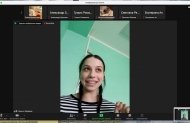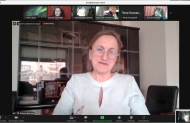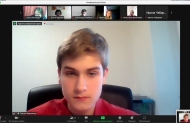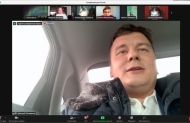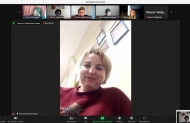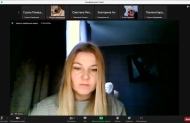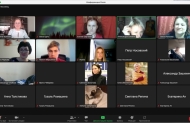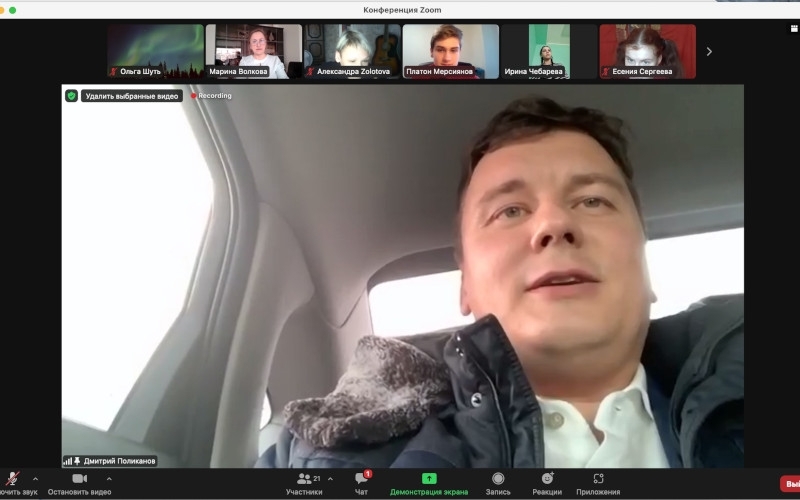
The positions of Dmitry Polikanov can be discussed for a long time. He is a public figure, an Africanist, and a member of the Supervisory Board of the Lake Baikal Foundation. Media volunteers of the Happiness Department of the Eurasian Peoples’ Assembly got acquainted with his different sides. During almost an hour of the meeting with Dmitry Polikanov, various topics were touched upon. Young journalists talked about the extensive professional activities of the guest, but most of all they were interested in personal. EURASIA KIDS has prepared a material where the main points from the last meeting are collected.
About the main values in childhood. I think the most important thing is to remember your childhood dream and then follow it. Because in childhood we dream of the right things that are close to us and that help us live our life, and not the one that our parents "drew".
About confidence. Sometimes, of course, I doubt, like all people. There is such a phrase: "The main quality of a leader is the ability to doubt." That is, it is necessary not to rush to do something right away, but to weigh all the pros and cons. When you go ahead, it does not always lead to a good result.
About children's hobbies. I was lucky as a child. At the age of 13, I got into the center of children's diplomacy, where children were trained as peace ambassadors. Our task was to tell about the life of children in the USSR. I was taught to communicate with people from other countries, public speaking, working on a computer – then it was a rarity. These skills were very useful to me in the future and eventually led me to diplomacy.
About diplomacy. Diplomacy is the ability to find a common language with people. In life, it is very important to understand what people want from you, because everyone says the same words, but puts their own meaning into them. Another important human quality is the ability to listen and hear. Our brain does not perceive all the words we hear, which can lead to conflicts. Therefore, in life and diplomacy, it is important to be able to hear each other.
About a book for NGOs. My task was to tell other non-profit organizations about the experience of the Co-Unity Foundation. Tell us what we did right and what we did wrong. In order for other NGOs not to repeat our mistakes and, on the contrary, take something into service. Although it seems to me that the book will also be interesting to ordinary people, because there are tips on PR, interaction with the state, management, working with personnel, and so on.
About book publishing. All publishing houses work on a very simple principle. First they look at the manuscript, and if they like it, they accept it. Publishers are interested in working not with one-time authors, but with those who will write a series of books. So if you have an introduction to the continuation of the manuscript, then the chances of being printed increase. In addition, now there are many services that allow you to print a book without a publisher and for little money.
About his first book. I published my first book in '97, when I was 25 years old. It was very funny. I happened to see that a conference was being held at the Institute of Africa. I went there and asked to be taken to this conference with a report. They looked at me like a fool, but then they offered to write a book in collaboration. In this union, I wrote, and they told me how to do it correctly.
About working at the National Geographic Society. The Russian Geographical Society has three main tasks.
The first is conducting expeditions to discover new lands and so on. New territories are constantly appearing in the world, for example, glaciers in the Arctic Ocean are melting and new islands appear. We need to come up with names for them, describe them, put them on a map, and so on.
The second part of the work is the popularization of geography as a science. That is, various geographical dictations are carried out; we have ensured that schoolchildren take the Unified State Exam in geography.
The third task is the preservation of historical heritage. The society helps to restore or preserve historical monuments and even conducts various archaeological excavations.
There is also a fourth mission of the Russian Geographical Society – the protection of rare animals. I remember they had a project to revive the Przewalski horse species. This is a wild horse, there are very few of them left in the world. There was also a project to increase the population of Amur tigers. There are also very few of them left because of Chinese and Russian poachers. Camera traps were set up to track their number, exercises were held with local residents so that they would stop hunting tigers, and so on.
About competent time management. Everyone asks me, "How do you manage everything?" Every day I start by writing down on a piece of paper the things that need to be done, and I note the urgent ones and those that can wait. Then I cross out done during the day. You definitely need to plan your leisure time, because we don't have free time, we are always busy with something. If we don't schedule free time, we won't have it at all.
The second important rule of time management is concentration on one task. A person cannot do several things at the same time and keep up with everything. It doesn't happen that way. You do everything in time when you are in focus.
About happiness. I believe that a person is happy when he is in harmony in different spheres of life. For example, helping people brings me joy.
About hobbies. I love to travel; I used to love learning languages. Now I'm learning to play the piano and drums. I go to acting classes. I have a boring life, a serious job. Therefore, you need to be distracted from time to time by creative things.
Karina Paronyan




